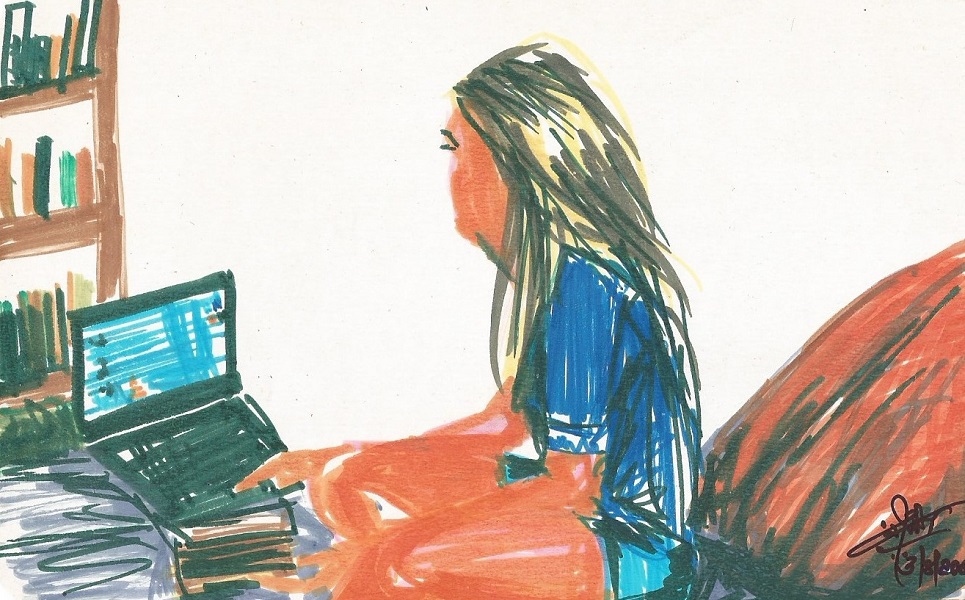In a world dominated by social media book reviews and ratings, critics still have a place and continue to offer readers a discerning response to the books of their day.
History is rife with examples of disagreements between writers and their critics, some dignified and limited to cordial penned exchanges defending their respective positions, others chilly and followed by long periods of no interaction, and still others unfortunately degenerating into enraged, at times violent, though more often comical expressions of displeasure (spitting, slapping, shooting a bullet through a book). Only last year, when the then-New York Times bookcritic Parul Sehgal observed that Salman Rushdie’s best work has long been written, and that in comparison his later novels including the 2020 Quichotte are “wobbly, bloated and mannered,” Rushdie was not happy. He described her on Twitter as being “high on the list” of critics with the “motiveless malignity of Iago towards Othello” and advised readers to discard reviews and decide what they think of books themselves.
It is not difficult to see why a writer might feel affronted by negative criticism of their work, though most writers would probably not wish the critic’s profession away entirely. Most books take months, if not years to complete, and demand far more than the writer’s time. Books are however written for an audience, including an audience of critics, and feedback is inevitable and mostly welcome. What the writer wants from a critic then is affirmation, to be told their work is indeed good.
The job of the critic however is not to proffer bland congratulations on a job well done. In fact, the critic is not talking to the writer at all (at least not first and foremost), but to the reading public. Here, the role of the critic is not to provide a thumbs-up or a star-rating that may serve as a prompt to purchase and read the book, assurance that it is indeed worth the investment of the reader’s limited leisure time. Yes, a star-rating might serve as a useful summation of a reviewer’s overall estimation of the book. But it is the literary essay that throws the book into interesting and multifarious new light, both by intricately parsing the text for meaning, for metaphor and for aesthetic value, and by standing back and taking note of what space the text occupies in the larger world—of books, of writers, of ideas. The critic must accomplish this without losing the capacity for complete submersion in the characters of the text and their world.
At this point, it is worth observing that book reviews are distinct from literary criticism (and reviewers from critics). Book reviews provide an appraisal of a book upon its release, are relatively short, and are aimed at the reading public/potential consumers. They must at the very least, explicitly or through the opinion provided therein, convey to the reader whether or not a book is a worthwhile read. Literary criticism is under no such obligation. Literary essays published as part of academic pursuit will apply certain frameworks and theoretical strategies to a writer’s work/s to draw thematic or other connections, elucidate meaning, or achieve some other set objective. In this scholarly context, literary criticism is guided by fairly narrow constraints which will be described early in the writing. Further, this sort of writing is aimed at audiences with an interest in literature that extends beyond works of literature themselves. While the distinction between reviews and criticism is useful for disambiguating between the contexts and overall purpose of each, it does not mandate that reviews, in achieving their chief aim of giving the reader a sense of the book, oversimplify or avoid any deep consideration of the text along lines typically found in criticism. On the contrary, the book review may very well rise to the level of literary criticism. When writing a review, however, the critic enjoys much freedom and can draw from a multiplicity of approaches, even as their own response remains at the heart of the piece. Since this article is talking about this sort of reviewer/critic, the two terms are used synonymously.
The idea that criticism is unnecessary for the reader and does not contribute to the enjoyment or understanding of the book is not new. There is of course the view of the critic as a mediator with unjustified power or voice. The problem for many here is not so much that critics have a voice, but that this voice is used to say unpleasant things. This resentment is captured by Kurt Vonnegut, who writes in Palm Sunday, “As for literary criticism in general: I have long felt that any reviewer who expresses rage and loathing for a novel or a play or a poem is preposterous. He or she is like a person who has put on full armour and attacked a hot fudge sundae or a banana split.” Many grudge the critic their judgments, and the fact that the task of criticism does not strictly require any formal learning nor the use of objective criteria. Nor especially the achievement of their own work of literature. “Don’t bow down to critics who have not themselves written great masterpieces,” advised Lawrence Ferlinghetti. Of course, Vonnegut and Ferlinghetti are silent about the amenable role of a critic, their responsibility towards readers when writers serve up a turd as a hot fudge sundae or a banana split.
It might be tempting to resent the critic for not being a writer (which isn’t to say the two professions are necessarily mutually exclusive—there are writers who are critics and vice versa), yet pronouncing usually in far fewer words than the books they are critiquing, their various merits and flaws. But as any reader who has felt genuinely enriched by a review will tell you, literary critics have their place and do contribute to the enjoyment of literature. Firstly, of course, they bring credible attention to books worth reading. With hundreds of books released every month, readers may not have the time or the inclination to go over lists and blurbs to choose a book. This is especially so when it comes to reading new writers or genres they may be unfamiliar with. Established critics can be depended upon to make selections guided by a combination of relevance/significance and interest. Secondly, though, and more importantly, critics provide perspectives that the reader may have missed entirely, whether from a lack of familiarity with certain themes or works, or from the limitations of their own thinking and reading. This is where critics have the most to contribute, as what they say can transform a reader’s view of a book or a writer completely, either helping them better appreciate the text they would otherwise have simply disliked, or else pointing out flaws the reader may have been prone to overlook. In either case, the reader emerges wiser. Of course, the reader may choose to disagree with the critic or to find a review (or even a school of criticism) inadequate or problematic. While the goal of the critic is not to polarize or alienate readers, part of what the critic brings to the table is their own personal response to the book—what irked them, what thrilled them, what bored or baffled them. In providing both an intellectual and a visceral response to literature, the critic then draws the reader outside the confines of the pages of particular books, to consider larger conversations on the book and on literature in general. Many a critic has achieved this with panache, without formal training and without having ever written their own work. If writers without MFAs can win Bookers, it is extremely disingenuous to expect that all critics be Lit.Majors.
Despite their potential to enliven and shape literary discourse, literary critics are today often viewed as somehow superfluous in the world of publishing, tolerated by writers and read by a few. As evidence for the redundancy of critics in the publishing world are the many newspapers that have in the past couple of decades cut down on or discontinued altogether sections dedicated to book reviews. Here, commercial considerations rather than anything else guided these moves. The task of selecting, recommending and reviewing books then falls to a combination of advertisements and content pushed by publishers, as well as reader/customer reviews on sites like GoodReads or Amazon, and even Instagram. And it is probably true that a large sub-section of readers are increasingly turning to these sources to supplement their reading habit and guide their decisions, as they might if they had to choose a new refrigerator or running shoes. Many even celebrate the democratic character of social media reviews, which no doubt have their place. But as Charlie Kaufman, filmmaker and auteur par excellence, observes, the role of the critic is more expansive and onerous than that of the reviewer. While the reviewer can rest content in the knowledge of having served the reading public with as much as a thumbs up or thumbs down, the critic owes it to the audience to furnish them with a vocabulary to convey the merits or demerits not only of particular works but of many, indeed all, works of the kind subject to enlightened criticism. He talks about how he always regretted not being able to convey to his father what was valuable in the art of Rothko, and how he wished he had consumed enough criticism to have acquired the resources to make a Rothko-enthusiast of his father.
Thankfully, despite budget cuts shrinking the space for books in newspapers and magazines, literary criticism continues to flourish. An overabundance of promotional articles, listicles, and paid “customer reviews” might lead to a false sense that real criticism is dead, that only saccharine recommendations make their way to the reader’s attention. The truth though is that genuinely good reviews are far more accessible for far more people than ever before. That alternatives proliferate does not take away from this fact. Some of the best critics continue to write for mainstream publications, and beyond these are numerous literary magazines, journals, websites and blogs with devoted readers from around the world. Readers can and do use the resources at hand to access a variety of criticism on the authors and books they read and are interested in reading. Readers in India for instance can easily and at very little cost access book reviews in the New York Times, the Guardian, the Telegraph, among others, not to mention literary magazines. Rumours of the demise of literary criticism have indeed been greatly exaggerated.






Pingback: Overcoming Adorno's Aesthetic Critique - Middlebrowse